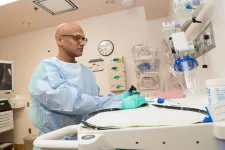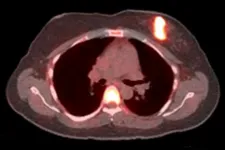(Press-News.org) A new Veterans Affairs study finds that delays in undergoing colonoscopy following an abnormal stool test increase the risk of a colorectal cancer diagnosis and cancer-related death.
The results appeared online in the journal Gastroenterology in January 2021.
In a retrospective study of more than 200,000 Veterans, the researchers found that patients who received colonoscopy more than 13 months after an abnormal stool blood test were up to 1.3 times more likely to have colorectal cancer, compared with those who had colonoscopy up to three months after the stool test. Odds of an advanced stage of cancer at diagnosis were up to 1.7 times higher when colonoscopy was delayed beyond 16 months.
The findings also showed the risk of colorectal cancer-related death increased by up to 1.5 times when colonoscopy was delayed more than 19 months.
The cohort included Veterans who had an abnormal fecal immunochemical test (FIT) or fecal occult blood test (FOBT). Both are common stool blood screening tests that, when abnormal, require a follow-up colonoscopy to evaluate for precancerous and cancerous colorectal growths known as polyps.
Dr. Folasade May, a gastroenterologist at the VA Greater Los Angeles Healthcare System, led the study. In light of the results, she and her team emphasize that improved colorectal cancer outcomes call for colonoscopy within one year of an abnormal stool test, which is when blood is detected after a sample is sent to a lab.
"These findings extend current knowledge about the clinical implications of time to follow-up after abnormal FIT-FOBT," the researchers write. "Further work should include [efforts] that address barriers to [undergoing] colonoscopy after abnormal non-colonoscopic screening results and policies to encourage the routine monitoring of follow-up rates."
This is the first study in the United States, the researchers note, to examine the risk of death linked to delays in undergoing a colonoscopy following an abnormal stool blood test.
Excluding skin cancers, colorectal cancer is the third-most common cancer diagnosed in men and women in the U.S. It's also one of the most preventable forms of cancer. Incidence and death related to colon cancer can be significantly reduced by the detection and removal of pre-cancerous polyps and the cancer itself.
"Currently, there is no national policy or standard for the clinically acceptable time interval between an abnormal FIT-FOBT result and diagnostic colonoscopy," May and her colleagues write. "Time to colonoscopic follow-up varies widely in practice and across health care settings. A recommended interval that is too long can contribute to polyp progression and stage migration of colorectal cancer, risking the need for more aggressive and morbid treatment, as well as less favorable outcomes."
The investigators accessed electronic health record data of Veterans who had an abnormal stool test between 1999 and 2010, who had no history of colorectal cancer or inflammatory bowel disease, and who were between 50 and 75 years of age. The cohort, which was mostly male, averaged 61 years of age.
Many health care experts believe that stool tests, such as FIT, are as reliable as colonoscopy in screening for colorectal cancer. "If your doctor tells you a colonoscopy is better, that's not accurate," Dr. Alex Krist, chairman of the U.S. Preventive Services Task Force, an independent panel that reviews evidence and issues recommendations, told The New York Times. "The data show the tests are equally effective at saving lives."
The use of stool tests has increased during the COVID-19 pandemic because of the convenience and safety of home testing and because patients may be reluctant to go to a health care facility for colonoscopy.
Dr. Samir Gupta, chief of gastroenterology at the VA San Diego Healthcare System, co-authored the study. Many patients and some primary care providers do not understand the importance of having colonoscopy after an abnormal stool test, he says.
"Some patients and providers even explain these results incorrectly, attributing abnormal results to hemorrhoids, something that was eaten, or other problems," Gupta says. "They don't believe the results. The results of this study should raise awareness that delaying colonoscopy after an abnormal stool test can have major consequences, including increased risk for cancer diagnosis, late-stage cancer at diagnosis, and death from colorectal cancer. These findings can also help motivate patients and providers to make sure colonoscopies are completed after an abnormal test."
The study findings will have even greater implications as more non-invasive tests for colorectal cancer screening come on the market, Gupta adds.
"With stool tests, such as FIT and FIT-DNA, already covered by most insurance companies and with promising new blood-based screening tests for colorectal cancer under study in large trials," he says, "the challenge of ensuring complete screening, including initial completion and follow through to colonoscopy after an abnormal test, is likely to grow substantially."
INFORMATION:
The complex mechanics determining how galaxies spin, grow, cluster and die have been revealed following the release of all the data gathered during a massive seven-year Australian-led astronomy research project.
The scientists observed 13 galaxies at a time, building to a total of 3068, using a custom-built instrument called the Sydney-AAO Multi-Object Integral-Field Spectrograph (SAMI), connected to the 4-metre Anglo-Australian Telescope (AAT) at Siding Spring Observatory in New South Wales. The telescope is operated by the Australian National University.
Overseen by the ARC Centre of Excellence for All Sky Astrophysics ...
A combination of genetic mutations may explain the higher incidence of and poorer outcomes from pediatric leukemia in Hispanic and Latino children, according to Penn State College of Medicine researchers. They said a novel therapeutic drug combination - as well as testing for these mutations - may help address the disparity.
Hispanic and Latino children are between 1.2 and 1.75 times more likely to develop B-cell acute lymphoblastic leukemia (B-ALL), the most common childhood cancer, than non-Hispanic and Latino children. They also have a 40% higher death rate than their counterparts after correcting for socioeconomic factors. Dr. Sinisa Dovat, a researcher and pediatric ...
COLUMBUS, Ohio - People who start adulthood with a body mass index (BMI) in the normal range and move later in life to being overweight - but never obese - tend to live the longest, a new study suggests.
Adults in this category lived longer than even those whose BMI stayed in the normal range throughout their life. Those who started adulthood as obese and continued to add weight had the highest mortality rate.
"The impact of weight gain on mortality is complex. It depends on both the timing and the magnitude of weight gain and where BMI started," said Hui Zheng, lead author of the study and associate ...
According to the Barker hypothesis (Hales and Barker 1992) (also referred to as "small baby syndrome"), infants with too low body weight have an increased risk of suffering from cardiovascular diseases, high blood pressure, diabetes and chronic kidney diseases in adulthood. According to this hypothesis, fetal protective mechanisms enable adaptation to unfavorable intrauterine conditions (chronic oxygen or nutrient deficiency) and allow for fetal survival. At the same time, however, they lead to permanent structural and functional strains and changes into adulthood. The comprehensive study recently published in Nature Communications now clarifies central mechanisms of this phenomenon.
Fetuin-A plays a key role
Under the program of the Swiss National ...
ATLANTA - FEBRUARY 2, 2021 - A new study finds that long-term aspirin use before a diagnosis of colorectal cancer (CRC) may be associated with lower CRC-specific mortality. The report that appears in JNCI: The Journal of the National Cancer Institute, suggests that the findings for pre-diagnosis aspirin use might help reduce CRC mortality in the overall population by limiting metastatic spread of colorectal tumors before diagnosis. Preventing distant metastases leads to fewer deaths from colorectal cancer.
The study, led by Peter T. Campbell, PhD, of the American Cancer Society, used data from men and women enrolled in the American Cancer Society's Cancer Prevention Study-II (CPS-II) Nutrition Cohort who were cancer-free ...
A surgical procedure meant to counter ulcerative colitis, an immune disease affecting the colon, may trigger a second immune system attack, a new study shows.
The study results revolve around the immune system, the cells and proteins that destroy invading bacteria and viruses. Activating it brings about inflammation, responses like swelling and pain that result from cells homing in on the site of infection or injury. Autoimmune diseases like ulcerative colitis occur when this system mistakenly damages the body's own tissues.
Colon tissue damaged by the disease is routinely addressed with a "J-pouch" procedure wherein a pouch is surgically constructed from nearby, healthy ...
Toronto, ON - Results of a multi-centre, international, clinical trial co-led by Peter Munk Cardiac Centre (PMCC) cardiologist Dr. Dinesh Thavendiranathan point to the benefit of using a more sensitive test to detect heart function issues early, so cancer patients don't have to fight heart failure too.
Unfortunately, for 1 in 20 high-risk patients, treating cancer with certain therapies means the added potential of developing heart failure. The one-year results of the highly anticipated trial compared heart function at the end of anthracycline-based chemotherapy, a treatment that can successfully treat cancer but ...
DALLAS, Feb. 2, 2021 — Young, Black adults are more than twice as likely to die in the first year after a heart transplant when compared to same-age, non-Black heart transplant recipients, according to new research published today in Circulation: Heart Failure, an American Heart Association journal.
Research has consistently shown that Black heart transplant recipients have a higher risk of death following heart transplantation compared to non-Black recipients. Black patients have higher prevalence of cardiovascular disease at younger ages, and therefore, they may need heart transplants at younger ...
Hormone therapy commonly is given as a targeted treatment for women whose cancer cells carry receptors for estrogen. But the therapy only works for about half of all patients. Until now, there hasn't been a good way to reliably predict who will benefit and who will not.
Researchers at Washington University School of Medicine in St. Louis have shown they can distinguish patients likely or unlikely to benefit from hormone therapy using an imaging test that measures the function of the estrogen receptors in their cancer cells. In a small phase 2 clinical trial, the researchers showed that the cancers of all patients with working estrogen receptors remained stable or improved on hormone therapy, and progressed in all women with nonfunctional ...
A new method for constructing special solar cells could significantly increase their efficiency. Not only are the cells made up of thin layers, they also consist of specifically arranged nanoblocks. This has been shown in a new study by an international research team led by the Martin Luther University Halle-Wittenberg (MLU), which was published in the scientific journal Nano Letters.
Commercially available solar cells are mostly made of silicon. "Based on the properties of silicon it's not feasible to say that their efficiency can be increased indefinitely," says Dr Akash Bhatnagar, a physicist from the Centre for Innovation Competence (ZIK) "SiLi-nano" at MLU. ...



